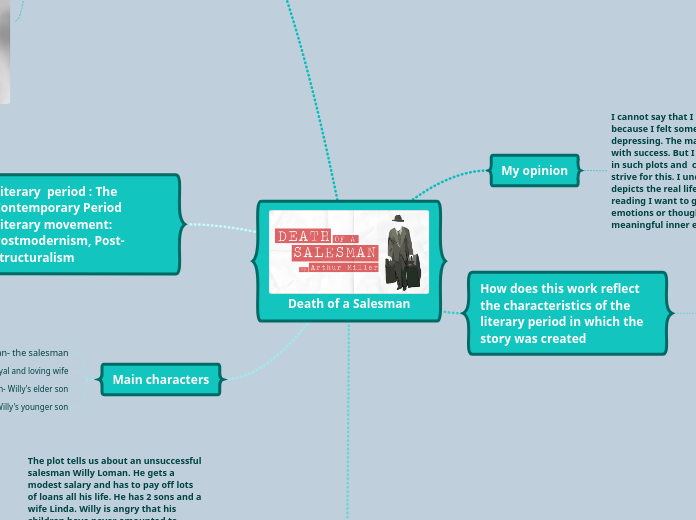
Death of a Salesman
My opinion
I cannot say that I like this plot, because I felt something boring and depressing. The main thing is money with success. But I am not interested in such plots and characters who strive for this. I understand that it depicts the real life, but in books, in reading I want to get the positive emotions or thoughts about more meaningful inner experiences.
How does this work reflect the characteristics of the literary period in which the story was created
The characters concern only about money and success (only Biff does not want to become mercenary). Even at the funeral relatives mourn not the person, but the lost benefit from him. Also I felt some kind of irony in the plot. The denial of the usual hierarchy of values The denouement is quick and unexpected.
biography of the author
Arthur Asher Miller (October 17, 1915- February 10,2005) was an American playwright, essayist and screenwriter in the 20th- century American theater. Miller was born in Harlem, in the New York City borough of Manhattan. He was Jewish and of Polish- Jewish descent. In 1940, he married Mary Grace Slattery. In June 1956 he left her and wed film star Marilyn Monroe. They divorced after 5 years of marriage. Then Miller married photographer Inde Morath in February 1962. Among his most popular plays are "All My Sons"(1947), "Death of a Salesman"(1949), "The Crucible"(1953). Miller was often in the public eye, particularly during the late 1940s, 1950s, and early 1960s. During this time he was awarded a Pulitzer Prize for Drama. He died at age of 89 of bladder cancer and heart failure.
Literary period : The Contemporary Period
Literary movement: Postmodernism, Post-structuralism
Main characters
William "Willy" Loman- the salesman
Linda Loman- Willy's loyal and loving wife
Biff Loman- Willy's elder son
Harold "Happy" Loman- Willy's younger son
Plot summary
The plot tells us about an unsuccessful salesman Willy Loman. He gets a modest salary and has to pay off lots of loans all his life. He has 2 sons and a wife Linda. Willy is angry that his children have never amounted to anything. Willy instills frankly dubious values in his children and even teaches them to steal. Willy is in the middle of an affair with a receptionist, when Biff arrives unexpectedly at the hotel room, and sees the woman, who is half-dressed. From this moment, Biff's view of his father changes and sets him adrift. After Biff conveys plainly to his father that he is not meant for anything great, insisting that both of them are simply ordinary men meant to lead ordinary lives. Son tries to get father to let go of his unrealistic dreams. Unable to withstand the emotional stress, Willy decides to "reward" his son with 20.000 dollars (payment on an insurance policy). He gets himself killed in a car accident. The final scene takes place at Willy's funeral, which is attended only by his family. Biff retains his belief that he does not want to become a businessman like his father. Harold, on the other hand, chooses to follow in his father's footsteps, while Linda laments her husband's decision just before her final payment on the house. Biff sums up his father's life: "He never understood what he is". He decides to leave and live a simple life.
